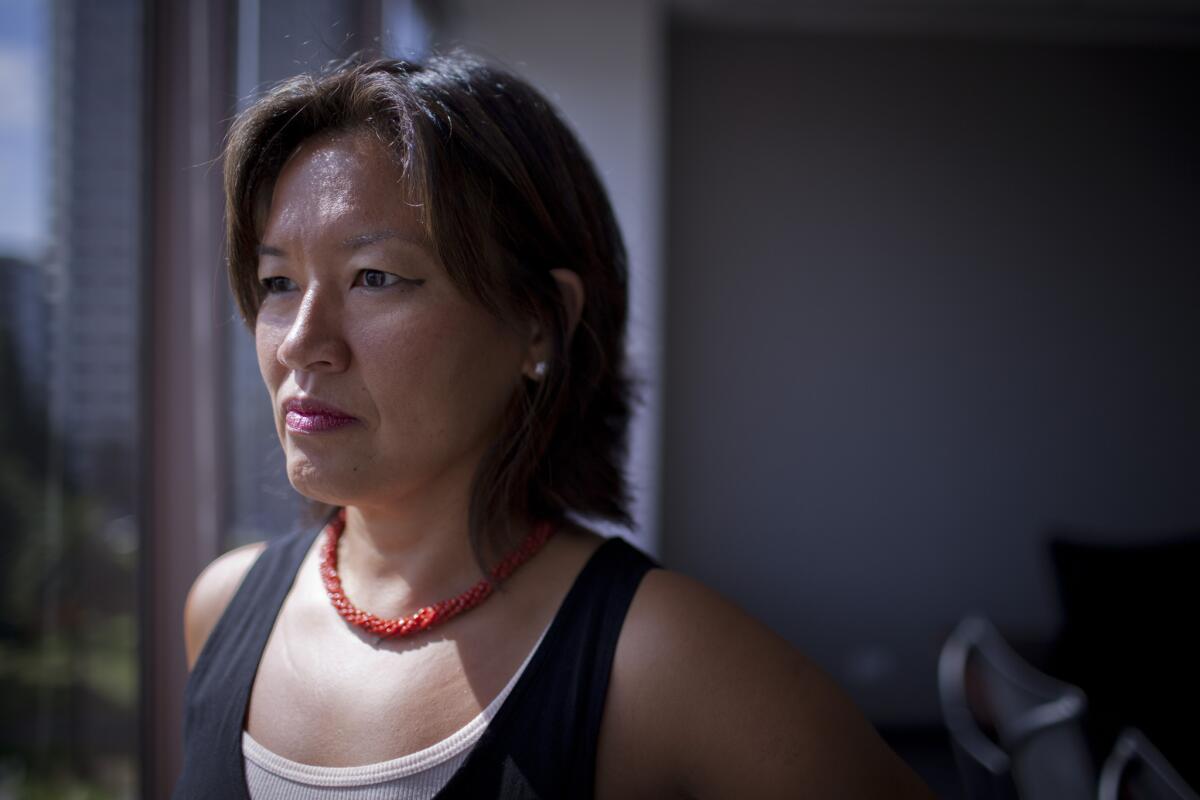Divorced couple’s frozen embryos must be ‘thawed and discarded,’ judge rules

Dr. Mimi Lee battled in court with her ex-husband over frozen embryos that they saved after she was diagnosed with cancer.
- Share via
Reporting from San Francisco — A San Francisco judge ruled Wednesday that frozen embryos a woman wants to use over her ex-husband’s objections must be “thawed and discarded.”
Superior Court Judge Anne-Christine Massullo, in an 83-page decision, upheld a consent form the couple signed shortly after their marriage in 2010. The couple agreed on the form provided by the fertility clinic that the embryos should be destroyed if they divorced.
“It is a disturbing consequence of modern biological technology that the fate of nascent human life, which the embryos in this case represent, must be determined in a court by reference to cold legal principles,” Massullo wrote.
The ruling was a strong rebuke to Dr. Mimi C. Lee, 46, an anesthesiologist and musician, who argued the embryos were her only chance to have a child of her own because of her age. The judge questioned Lee’s motives and credibility and said she had not even proved she was infertile.
Stephen Findley, Lee’s former husband, wanted the embryos destroyed. He said their divorce had been acrimonious and he did not want to be tied to Lee for the rest of his life with a child.
In the first such ruling in California, Massullo decided the consent agreement was a binding contract.
“IVF clinics and individuals who participate in the IVF process must have some certainty about dispositional choices before embryos are created,” the judge wrote.
Lee discovered she had breast cancer just before her marriage and decided with Findley to create and store the embryos to preserve her fertility. The couple separated in 2013 and divorced earlier this year.
She testified during the trial in July that she considered the fertility clinic agreement a mere consent form, akin to a medical directive, and thought she could later change her mind.
But the court did not believe her and described her as evasive and contradictory on the witness stand.
“Given Lee’s education, profession and intelligence, the court finds that her testimony that she did not intend to enter into a binding agreement was not credible,” Massullo wrote.
Massullo said Lee signed the agreement “voluntarily and intelligently” and called it “striking” that Lee did not attempt to preserve her eggs when her marriage with Findley began to founder.
Although Lee’s chances of having a child at her age are low, they are “not a zero percent chance,” the judge said.
Massullo said Lee’s offer to waive child support was meaningless because such an agreement could not be enforced in California.
She said Lee’s failure to make more efforts to preserve her fertility showed she “was ambivalent about having a child both during and after her break-up with Findley” and called “well founded” Findley’s belief that Lee would use any child born of the embryos to try to get more money from him.
“Findley should be free from court compelled fatherhood and the attendant uncertainties it would bring,” the judge wrote.
She declined to rule on whether Lee had a constitutional right to procreate, but said Lee clearly didn’t have a right to do so with Findley.
During the trial, Lee wept often and described the embryos as her “babies.” She said in an earlier interview that each embryo had a 20% chance of leading to a birth.
Findley testified that he would like to have children someday, but not with Lee. He said she once asked him how much money the embryos were worth to him and indicated she could turn a future child against him.
On the fertility question, Lee presented an expert who said a woman of her age had 0.03% chance of having a child. Another doctor testifying for the fertility clinic estimated that Lee’s chance of becoming pregnant was between 0% and 5%.
In about a dozen other embryo disputes around the country, not one high court has decided to award an embryo to someone over the ex-partner’s objection. No appellate court in California has decided the issues posed in the Lee-Findley case, but Massullo said her ruling was consistent with how other courts in the nation have viewed such cases.
Binding agreements minimize the need for court resolution of what many believe is one of the most personal decisions an individual makes: when and under what circumstances to bring a child into the world.
A spokeswoman for Lee said she was disappointed and considering her options. She had indicated previously that she would appeal if she lost.
Findley could not be reached for comment.
Twitter: @mauradolan
ALSO
Victim finds cellphone thief’s selfie in her cloud storage, police say
Historic Taco Bell building to make ‘run for’ Irvine on the back of a truck
450 illegal tamales from Mexico seized at LAX and ‘incinerated’ (not steamed)
More to Read
Sign up for Essential California
The most important California stories and recommendations in your inbox every morning.
You may occasionally receive promotional content from the Los Angeles Times.














